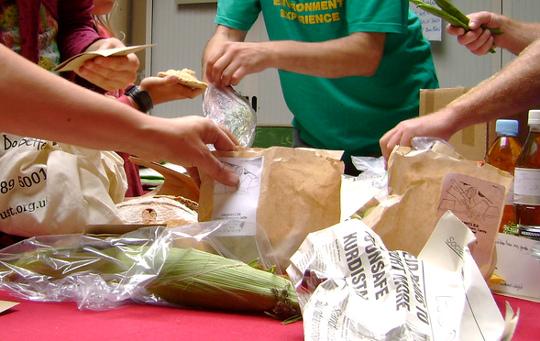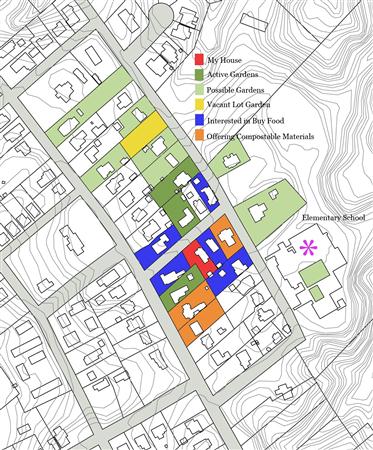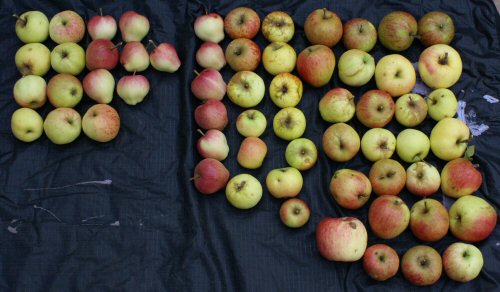Monthly Undermining Task, June 2010: It’s The Freeconomy, Stupid!
Posted by keith on June 12th, 2010
“The only ‘honest’ living available to the homeless in general is scavenging – and in general they’re quite content to make that living. It’s work they can do without having an address, submitting to supervision, punching a clock, or maintaining a wardrobe of socially approved clothing – and it’s flex-time all the way.”
– Daniel Quinn, Beyond Civilization
I have to let you into a little secret – and I’m sure no-one will really mind, although in the short term at least there is understandably going to be a certain amount of resistance – about a dream I have. You might know that in April 2010 we moved to a village in southern Scotland to get some distance away from the hyper-consuming culture that dominates the area we had lived in as a family for many years. Two things transpired that we didn’t quite expect: first, that it was very easy to slip into a “village” mindset, whereby your entire life slows down and you need to change your opinion as to what you consider “essential” to life; second, that neither of us have found paid work, despite having long careers in our respective professions.
To most people reading this, the second thing would seem like a real problem, but it is counterbalanced – overriden in many ways – by two more things. The first of these is the result of the changed expectations that have manifested themselves so quickly: we haven’t been to the cinema or had a meal out as a family yet, nor have we suffered just because we can’t get precisely what we are looking for in the shops – we have, even more than we would have done in the “always available” culture, gone down all sorts of different avenues, or simply decided to forego what we might have previously had. The second counterbalance, is longer-term, but centres around the focus of this article: we are entering the Freeconomy.
This dream I have is evolving all the time, but the advert below should explain things quite well:
The key is not the computer work, but the words “Payment by barter or kind can be negotiated if you are a freeconomist.” In essence, I can repair your computer, and you can pay me money; alternatively, you can give me a bag of tomatoes, lettuce and radishes that you have grown yourself, for the amount of time and effort I would have had to invest in growing these things is probably the amount of time and effort you would have to invest in working out how to fix your own computer. I can do this easily, as you may be able to grow things more easily than me – I am growing things, but could always do with more local, fresh food – or you may be able to quickly fix the door in my house that is bowing very badly; or you might play the fiddle, and be able to give my daughter a lesson.
The variations on this are almost endless, as exemplified by this list from the Freeconomy web site, Just For The Love Of It:
Cleaner, Shiatsu Practitioner, Hedge Grower, Swimmer, Dancer, Beer Maker, Food Forager, Ecologist, Reverential Ecologist, Spiritual Seeker, Thinker, Hedge Maker, Yurt Constructor, Compost Toilet Constructor, Freecyclist, Research, Medicinal Plant Gatherer, Yoga Student, Feltmaker, Natural Dyer, Felt making, Plant Spirit Med. Practitioner
The holder of these skills lives just over 7 miles from us, according to the map – but I wonder what a directory of all the useful skills the people who live only 100 metres from us would look like…
An interesting side-effect of using the word “Freeconomist” on this advert, which I have put in the window of the local Post Office and hairdressers, and am also putting in the village newsletter, is the seed of an idea that might be planted in the minds of the people reading it: “That’s interesting, someone is prepared to accept something other than cash for work – I wonder if…” Already, there is is some Undermining going on here: the economic system we have been taught to believe is the only way that anyone can do business – in the loosest sense of the word – is being threatened, both physically and culturally, by the idea that there are other ways to do things that don’t involve money, and by extension, don’t involve the exploitation of humans and the wider environment.
Mark Boyle, author of “The Moneyless Man” puts it like this:
I feel the environmental movement has got it’s head in the sand over the money issue…I believe that as long as the degrees of separation between the consumer and the consumed stay so wide, symptoms such as environmental destruction, sweatshop labour and factory farming will always exist, as people will remain as oblivious to the repercussions and consequences of what they consume as ever. Without money, you know the embodied energy and suffering that goes into all that you use. Until we face up to this fact, the symptoms will remain, because why would they change?
So what is this “Freeconomy” thing?
Essentially, it is a way of trading physical artefacts, skills and knowledge that doesn’t involve a symbolic intermediate stage, such as exchanging symbolic IOUs (cash), accruing interest (loans) or hoarding any type of representative currency.
Don’t be confused by writers who say Freeconomy is just “giving stuff away”: the big element missing from such a description is that Freeconomy does not fit into any conventional system of macro-economic behaviour – nothing is being accrued, there is no profit being made, there are no meaningful “economies of scale” beyond a few as opposed to one person making a job easier to manage. In actual fact, the label “Freeconomy” is a bit of a misnomer, for such a way of operating does have enormous intrinsic value, which is why we will probably have to think of a different name for it soon, or even more powerfully, just say, “This is how we live.”
There are many other labels for similar things operating at a variety of different scales or aspects of life: “localism”, “freeganism”, “slow food”, “self-sufficiency”, “resilient communities” and so on, and not all of them have the same value in achieving long-term, sustainable living; but all of them have some elements that, in one way or another, are undermining the destructive global economy, either directly, or by offering people a different way of thinking that doesn’t involve exploitation.
Whatever you call it, we can all do it to a certain extent – probably a greater extent than we realise. I offer below a short list of activities that can kick-start a Freeconomy wherever you happen to be, and perhaps deal a blow to the forces that claim, “If it don’t make a profit, it ain’t worth a bean.”
No Risk
The first stage on the path to Freeconomy is doing it yourself, rather than paying someone to do it for you. I explored this in an Earth Blog article some time ago:
Yesterday I took the children up to our neighbour’s house, and we filled up two wheelbarrows with logs – offcuts from their tree-surgery work. My brother-in-law also delivered some floorboards he had been asked to remove as part of his bathroom fitting work – they will make fantastic kindling. This year we may not have to use the gas-fired central heating at all: a little bit of pain for the gas company and the industrial machine, and a lot less pollution because the burning of logs in an efficient burner is a lot less polluting than my central heating.
Leaving my well-paid job to do full time environmental work was a step; learning to cook with just local, seasonal and dried produce was a step; starting to grow my own food was a step; switching off my central heating, after progressively turning it down further and further was a step; switching off the television and deciding to talk, play cards, read and just enjoy each other’s company was a step. But here’s an interesting thing: almost none of these steps will be featured in the countless lists you read in newspapers and magazines for “turning green” – they are all too big for the mainstream media, and even the mainstream environmental groups to propose to an “unwilling” public.
Aside from leaving my job, all of the other things I mention can be done by very many people with no pain. To someone indoctrinated in the necessity of money, these actions are selfish – you are apparently benefitting no-one but yourself and your immediate dependents; but to that I would ask the question: “What is the point of paying someone to do something for you, when you can do it yourself?” More pertinently, at what point was it deemed unacceptable for people to grow their own food, repair things, cook and bake from scratch, provide your own energy, and not rely on a network to provide your entertainment?
And then it gets even more subversive: you can start working with other people to share any excess; utilise each others’ skills and knowledge; provide support and company where it is needed…gradually the hooks the economic machine has dug into your flesh are eased out and thrown back. Not sure what other people need or what other people have that they can offer? Start talking; build communities within the place you live; share…
I came across a wonderful project recently: Aaron Newton had plotted his immediate neighbourhood, not by house price, crime rate or voting intention, but by the potential for community food growing:
I started by going across the street and asking my elderly neighbor if I could garden in her backyard. Then I recruited Eric who grows food in his backyard and is transitioning into a career as a farmer. Next I was able to start a garden in the backyard of the rental house next door to my property. It was part of a bartering arrangement whereby the landlord agreed to take down a few dying trees and in return I now grow food on her property. All of these active gardens are shown in dark green.
For many people, simply talking to neighbours is an alien concept – we have become ever more isolated as state and media-induced paranoia encroaches upon our psyches; everyone “out there” is a potential threat rather than a potential partner. Talking to your neighbours undermines this. And, of course, you don’t need to plot everything on a digital map – although that might be useful if you want to make the food sharing more organised; just keep a mental map of who is who and what you each have, then make sure you keep talking.
Referring back to my advert, someone noticed that I had an undue emphasis on Windows which, of course, is a commercial product. Windows is what I am best at (for shame!), but what Graham wrote below has encouraged me to suggest free alternatives to people:
It’s been said that future archaeologists will be able to identify a ‘Vista Upgrade Layer’ when they go through our landfill sites as thousands of tonnes of monitors, video cards and whole computers that are unable to run Microsoft’s latest operating system are being dumped as ‘obsolete’. So what better time to break out of the Windows’ ‘upgrade cycle’ by switching to Open Source alternatives such as Linux and taking back control of your computer? Ubuntu Linux for example is a completely free operating system in all senses of the word – that is, you can download and install it at no cost, and you are also at liberty to develop, modify and redistribute the source-code as you see fit. As well as being able to run on older computers, Ubuntu comes with pre-installed with many Open Source applications such web browsers, word processors, spreadsheets, graphics and photo editing programs, etc, the proprietary equivalents of which such as Microsoft Office or Photoshop could cost hundreds of extra pounds to buy.
I made the change to Ubuntu about 2 years ago, after being introduced to it at a skills sharing and permaculture workshop event, and despite being in no way a ‘techie’, found it incredibly user-friendly and easy to get along with, and a refreshing change from my old Windows desktop that was constantly trying to get me to buy something or ‘upgrade’ this or that. However, there are many other ‘flavours’ of Linux including Damn Small Linux and Puppy Linux that will even run on ancient 386 machines. Linux development tends to be community rather than corporate driven, thus is designed to meet the needs of users instead of big business. So as well as keeping otherwise obsolete computers out of the waste stream, the ethos of the Open Source software movement strikes me as being far more in accord with permaculture’s ethics and principles. Most Linux distributions can be run from ‘live’ CD’s, which means that you can try them out to see if they meet your needs before making any actual changes to your computer, so there’s nothing to lose in giving it a go!
And if that doesn’t make you want to consider Open Source software, perhaps this article will.
Low Risk
That last, small selection of ideas consisted of things that I would consider to be “No Risk”, and this is where it starts to get interesting – because I really want to categorise this next section in the same way; yet because we are all, to a certain extent, still dependent on money, the really positive things that come out of taking financial “risks” (in effect, creating negative risk) will undoubtedly cause some short-term pain.
Here’s one example: suppose you have a decently-paid job, but work long hours and genuinely haven’t the time to get involved in a community sharing scheme, or even growing some food so that you might swap things with your next-door neighbour. In order to gain that time back you have to work fewer hours, and thus take a wage cut. You could ask to work from home, thus cutting out travelling time, but few companies offer this option (though wouldn’t it be a real boon for so many workbound people to get back a part of their lives?) So, a time and wage cut it is. The immediate effect is relative financial hardship, regardless of your attitude to money.
Bridging the gap will be hard if you consider everything in your life to be essential; but think of it like this – how much of what you spend money on is the result of being urged to spend that money? When you have worked this out, then everything else is what is actually essential to you at the moment. If you don’t spend money on the “non-essentials” then I reckon your gap will disappear pretty quickly.
So now you have some time to use constructively, you can start being part of or even creating a community that shares things Just For The Love Of It. That could easily take up all of your time – the time you have left after perhaps spending more time with yourself, your family and your friends: your immediate community. If you feel comfortable working towards a moneyless community, without rocking the boat too much, then you have my wholehearted support: never think what you are doing is not entirely worthwhile, because what you are doing is far more human than living a life dependent on the industrial economy.
But you might want to do a bit of boat-rocking; perhaps bending the law, or kicking the money economy where it hurts. Some of the lower risk options were covered in a previous Monthly Undermining Task called “Throwing Off The Shackles of Debt“, and if you do have any debt, or would like to take the debt burden off others, then I recommend you start there.
Scattered around both urban and rural spaces are all sorts of food sources, in the form of fruit and nut-bearing trees, as well as other plant sources heaving with nutrition. There is a USA-only directly called Neighborhood Fruit which specialises in pointing out completely legal options; but going beyond this, there are often huge opportunities for scrumping in public parks and pseudo-private land where you just have to be a bit careful how much you take, and when you take it. The haul of apples below was from a local park, gathered in just over an hour:
Most of us have heard of “dumpster diving” and the Freegan movement – the simple act of taking disposed food from company skips is a grey area, hence why it is “Low Risk” – but how much other stuff is just left lying around, ready to be used in a constructive way? (N.B. This set of links, from the UK Freegans site is a wonderful source of Freeconomy related sites). Here is a list of things I have taken for subsequent use from public and not-so-public areas (avoid private homes, please, it’s just not fair) after a period of watching to make sure it wasn’t actively being used:
– Bark chippings from a country park
– Wooden pallets from a disused shop front
– Apricots from a pub car park tree
– Cast-off timbers from a construction site
– A wooden filing cabinet from a business skip
In effect, this is theft, so if you don’t want to do this yourself you could start a directory – as local or global as you like – of things that are simply waiting to be taken. It would need to be kept bang up to date, but could be a very useful addition to the money-free economy. I haven’t come across anything like this on my travels, but if you do know of an existing setup then please let me know.
Medium/High Risk
There is sometimes a fine line between recommending things that are borderline illegal, but which you could probably get away with, and things that you are almost certainly going to be arrested and charged for if you get caught. The following may not necessarily be illegal where you are but have to be approached with care, however positive the outcomes may be.
The single largest outgoing for most people is the cost of their home, whether in terms of mortgage or rental, or just the cost of running it and the various bills and taxes that enburden anyone who occupies a property – even one they have built themselves. Squatting is one option which, which not strictly an Undermining activity, can often be a vital way for people to get the financial freedom necessary to start a new kind of life. Opening up a squat for a number of people can be a very powerful statement, and trigger the creation of moneyless communities, but can also be risky both in terms of the law and personal safety. The Squatters Handbook is a vital resource and, while only covering English law, can undoubtedly be adapted to suit local conditions.
There is nothing new about squatting, and it is always worth reflecting on the story of The Diggers; a group of people in 17th century England who took it upon themselves to reclaim land they rightly believed had been stolen from the people. All they wanted to do was live, without having to be subservient to the systems of power and abuse. Take ten minutes to watch this film, and then another ten to think about what it means to you:
There is an increasing number of groups who have set up Intentional Communities, often under constant threat of eviction and other legal action being taken by those who purport to own the land upon which they are trying to live in a far more sustainable manner than the majority of people who live legally. The community web site known as “Diggers and Dreamers” takes its name from Gerrard Whinstanley’s brave band; and that is just one example, for there are all sorts of communities that are both highly sustainable (whether intentionally or not) and also removed from the industrial economic system to a great extent. The IC Wiki is the place to start if you want to take things to the next level.
Finally, something that is simple but a bit risky – again in a legal sense – but which could be wonderful if pulled off effectively. Retail companies exist to sell stuff for money – and the bigger the company, the more money they have made, and the more they have exploited people and the wider environment to make that money. So it makes you wonder what would happen if that model could be undermined, even for a short period: the company certainly wouldn’t change, but the people using the store or mall (think big!) might think again about what they are doing, spending wads of cash on things they don’t need, or often don’t need to pay for. What would happen, for instance, if under cover of darkness, someone were to affix a few signs proclaiming that everything was free? Not 10% or 20% off, but entirely free!
It would be bedlam, especially if someone had arranged at the same time to place an advert in a newspaper saying the very same thing. Can you imagine the impact of an advert in your local paper, saying that for one day only everything in one particular Walmart, Tesco or Carrefour was being given away for free.
Sometimes it’s worth spending a bit of money, just sometimes…










June 12th, 2010 at 10:27 am
Nice post, Keith, filled with great ideas. As usual.
We have a wonderful freeconomy in my rural community. We trade eggs from chickens and ducks and milk and cheese from goats for many goods and services, including mechanical work on the car, food, carpentry, and a big “dinner-time” triangle for the outdoor kitchen (okay, we didn’t really need that one).
Keep up the good work.
June 12th, 2010 at 10:44 am
Thanks, Guy – really appreciate that from someone who is well down the road :-)
June 13th, 2010 at 5:17 am
Been doing this for ever really. Nobody wanted to hire us for anything other than the occasional part time so we sort of had to rely on whatever else we could. Or get depressed!
Our computers are old and largely second hand – we run ubuntu. DH is IT so gets more random income than me. He also works for chocolate cake and beer :) I mostly seem to be a transfer point for stuff. Things not wanted are often recycled through my network of friends and relations (and ourselves of course). I also make what I can for the house hold and we do forage for fruit etc.
Sometimes I have to admit to a longing for a bit more stability especially for the kids but on the whole the community has been great – specially when I got really ill earlier this year. I’m thinking that perhaps I should give up on gardening as I just can’t do that any more except in a small way but I will look out for someone who might like to use some of the spare space in the back yard.
Its all swings and roundabouts but at least it is interesting!
viv in nz
June 13th, 2010 at 6:58 pm
Hi Keith, monster post this time. Love what you are doing. I was also going to suggest the Linux route, but have been beaten (convincingly) to the punch.
My story: I have used Linux for ten years, and exclusively for over five years in my business. It is so good that I turned it into a business in itself.
I now buy (very cheap) good quality computer hardware (Dell, Compaq, and IBM), refurbish it, load Linux, then rent this hardware to small businesses. I can provide a networked server for a small office for a fraction of the cost of buying one new, and I provide a 100% guarantee on the hardware. If it fails I replace it, no charge. I also do online offsite backup of data etc, etc the list goes on.
Have a look at: http://tbn.lindenrow.com.au/ for features.
Here’s a though for you: if there is a market for this sort of service in your area, feel free to replicate what I am doing. I am happy to pass on the setup code and knowledge to you to get something like this up and running (in the spirit of the freeconomy).
I can confirm what you are experiencing regarding changing your lifestyle. My partner and I live in a small rural town and there are few work opportunities (other than the local mines). As a result we have chosen to spend and consume less, rather than be slaves to the coal economy.
Like you, we don’t watch TV much at all, we have super insulated, rather than employ active heating, and we are growing our own food and preserving it for the off season.
Result: life is better. I don’t have, don’t need, and don’t want an ipod, ipad, iphone, Wii, XBox, new car …
Frankly I would rather a few more books and a new handle for the spade (will find a dead branch for that soon).
June 14th, 2010 at 6:05 am
Really appreciate both of your comments, Liz and LS – nothing to add really, except you are both doing great things.
K.
June 30th, 2010 at 1:49 am
[…] what cheers me up in the morning Posted on June 30, 2010 by alison1010 http://thesietch.org/mysietch/keith/2010/06/12/monthly-undermining-task-june-2010-its-the-freeconomy… […]
July 17th, 2010 at 10:56 am
freecycle does what you suggested and haven’t came across yet. active in different countries and regions
http://www.freecycle.org
thanks for all your ideas, greatly inspiring and helping me to go through with things that have been on my mind and heart for years but just didn’t dare to really do…